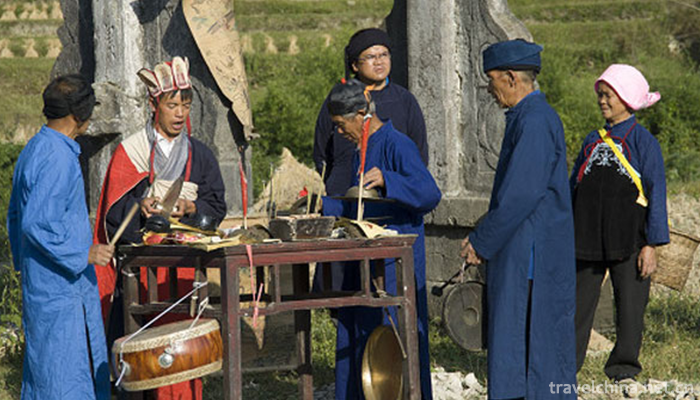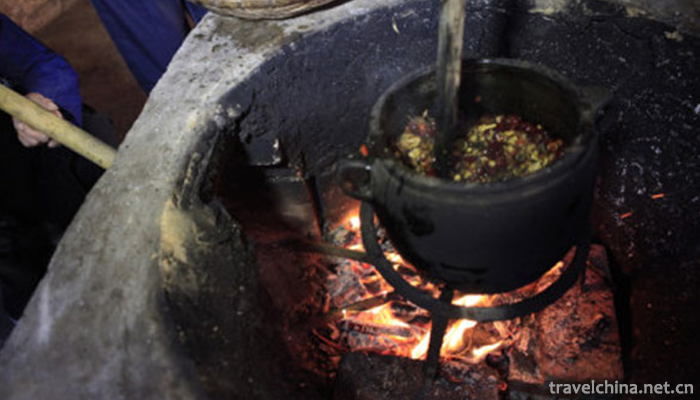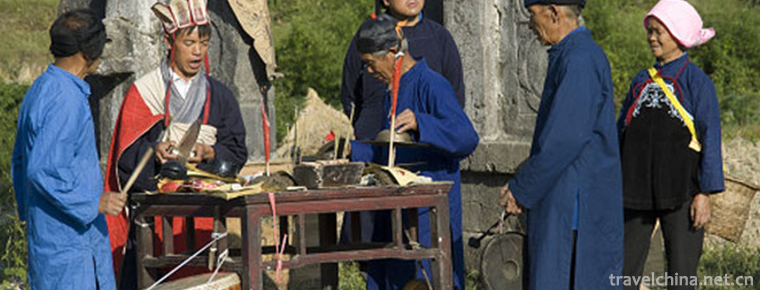Production Techniques of Buyi Medical Herbs for Benefiting Liver
Production Techniques of Buyi Medical Herbs for Benefiting Liver
Guiding County, Guizhou Province, is a subtropical monsoon rheumatic fever climate with distinct seasons, rich heat, long frost-free period, abundant rainfall and complex and changeable climate. Located in the watershed of the Yangtze River Basin and the Pearl River Basin, there are 144 large and small rivers. The density of the river network reaches 0.446 km, and the forest coverage rate reaches 48%. The products are abundant and the ecology is good. There are many kinds of plants, including 151 families, 474 genera and 881 species, which are distributed all over the county. Natural Chinese medicinal materials are rich in resources, such as Magnolia officinalis, wampee, mutong, louzi, anise maple, gardenia, Schisandra chinensis, cinnabar root, Gastrodia elata, dendrobium, Eucommia ulmoides, Codonopsis pilosula, Radix Polygoni multiflorum, Radix angelicae, Radix asparagus, honeysuckle, platycodon, Ganoderma lucidum and so on. Yigancao is processed from local multi-flavor medicinal materials.
historical origin
The Buyi nationality originated from Baiyue in ancient China and is an ancient nation with a long history. It has been called Puyue or Puyi, Liao, Fanman, Babo, Zhongjia, Nongjia, Bulang and Cage People in the past dynasties. "Song Shi Southwest Manchuan" contains: Buyi ancestors "bureaucrats" who "sickness, bronze drums, cypress to worship ghosts and gods." In Buyi people's inhabitants, the people seldom prevent diseases, only after the onset of the disease to take measures, or even helpless, had to ask ghost teachers to exorcise ghosts from disaster. Most ghost masters several kinds of herbal medicine. Besides eliminating ghosts and avoiding disasters, ghost masters also use some herbal medicine to cure diseases, so as to achieve the effect of "eliminating both gods and drugs". In order to fight against diseases, the Buyi ancestors paid attention to the therapeutic effect and toxicity of some natural drugs, and then used them. After countless scattered, but conscious experiments, observations, tastes and experiences, practical experience, gradually created and accumulated some medication knowledge. Through repeated practice and cognitive process, continuous summary, and gradually formed the early drug therapy. In the traditional medicine of Buyi nationality, most of them have mastered many local methods of treating diseases that have been handed down from generation to generation.
Overview of skills
Before collecting medicines, sacrificial ceremonies should be held in the field, presided over by the Buyi village elders, in order to pray for the elimination of disease and disaster, set up pure tea wine, in the rhythm of gongs, drums, fish and wood, singing while burning paper, offering sacrifices to the land with cock blood, pharmacists facing the east, clapping hands together, worshipping ancestors.
When the sacrificial ceremony is over, medicines should be collected immediately, and must be completed before 10 a.m.
Then the fresh medicines such as Ear grass, sour soup pole, Gardenia jasminoides, guest ants leaves and dandelion are washed and dried, and grinded with a bowl for reserve.
Finally, boil it in a crock and add the special recipe. It will be finished in 20 minutes.
All utensils are made of wood and stone, not stained with iron, in order to ensure the efficacy of drugs, they are prepared by the method of repair and water-fire co-preparation.
The correlator has hoes, planers, sickles and baskets for picking medicines, dustpans, sieves, pits, bowls, steamers and earthen pots for processing medicinal materials.
Important value
Historic value: Buyi people only have their own national language and no words of their own national language since ancient times. Oral history handed down from ancestors to apprentices plays an important role in memory. The inheritance of the secret recipe for preventing and treating liver diseases and benefiting liver and grass of Buyi nationality is precisely the local knowledge accumulated by the ancestors of Buyi nationality in history to conform to nature and prevent diseases, which has certain historical value of oral history.
Scientific value: The inheritance of the Secret Prescription for Preventing and Curing Liver Diseases and Benefiting Liver Grass of the Buyi Nationality is precisely the local knowledge accumulated by the ancestors of the Buyi Nationality in history to conform to nature and prevent diseases, which has a profound mass foundation. With the progress of science and technology and the development of theory and practice of traditional Chinese medicine, the new discovery and new understanding of the recipe of "Yigan Cao" is increasingly showing its inherent scientific value. "Yigancao" has abundant resources and relatively low cost, which can play a certain role in solving the contradiction between the high-speed growth of medical and health costs and the affordability of the national economy.
Holding sacrificial ceremonies in the field before collecting medicines, offering sacrifices to cocks'blood and worshipping ancestors are also of certain value to the study of Ethnology and folklore.
Survival condition
"The Secret Prescription of Benefiting Liver and Toxin for Preventing and Curing Liver Diseases of Buyi Nationality", developed by Guizhou Characteristic Pharmaceutical Co., Ltd. (won the second batch of provincial demonstration bases for productive protection of intangible cultural heritage in 2014), not only produces the national patent medicine "Benefiting Liver and Detoxifying Tea" for treating liver diseases, but also develops the "Benefiting Liver and Herb" plant beverage with the function of protecting liver and protecting liver, ” The transformation to modern process production. With the concern and support of Party committees and governments at all levels, the project of technological renovation and expansion of 50,000 tons of Yigancao plant beverage was launched in 2010. The two production lines were completed and put into operation on December 28, 2011 and December 28, 2012. Yigancao's annual output reached 20,000 tons. The two production lines have been put into operation, and more than 300 people have been employed in society.
In 2013, it was listed in the fourth national representative list of intangible cultural heritage protection.



-
2.Daocheng County
Daocheng county is located in the southwestern edge of Sichuan Province, south of Ganzi. Located in the southeast of the Qinghai Tibet Plateau, the eastern side of Hengduan Mountains.
Time 2018-10-12 -
3.Martial Art
Wushu is a technology inherited from ancient military wars. Martial arts can strengthen the body and defend the enemy
Time 2018-11-13 -
4.Harbin Jinyuan Cultural Tourist Area
Harbin Acheng Jinyuan Cultural Tourist Area, the capital of Jin Dynasty from 1115 to 1234, is the only well-preserved capital site of Jin Dynasty. Up to now, the Royal City's Wumen Gate and palace bui
Time 2019-01-13 -
5.Luzhou Laojiao Tourist Area
Luzhou Laojiao Tourist Area is located in Jiangyang District, Luzhou City, Sichuan Province. Its transportation is convenient. It is a tourist boutique created by Luzhou Laojiao Co., Ltd.
Time 2019-02-06 -
6.Qilian Mountain National Nature Reserve
Gansu Qilian Mountain National Nature Reserve is located at the northern foot of Qilian Mountain in the intersection zone of Qinghai-Tibet, Mongolia
Time 2019-02-07 -
7.Song Album
"Dongshan Song Book" was introduced from Chaozhou, Guangdong Province, in the Ming Dynasty. Its tunes were constantly changing in the singing of folk singers and gradually assimilated
Time 2019-04-30 -
8.Hakka ancient prose
As early as the late Ming Dynasty and early Qing Dynasty, Hakka ancient prose had been formed, mainly distributed in Gongjiang Town, Xinpi Township, Kuanta Township, Zishan Town,
Time 2019-05-09 -
9.Nanping Nanci
Nanping Southern Ci is a traditional form of music popular in Nanping, northern Fujian Province. It is generally believed that the Southern Ci in Jiangnan area developed gradually with the local tradi
Time 2019-06-07 -
10.Mosaic inlaid porcelain
Chinese mosaic art has a long history and unique style. In the Yin and Shang Dynasties, the decorative patterns of gold inlaid with jade appeared in bronze casting. With the continuous improvement of
Time 2019-07-06 -
11.Meishan economy
In 2019, the gross domestic product (GDP) will reach 138.02 billion yuan, an increase of 7.5%. Among them, the added value of the primary industry was 19.916 billion yuan, an increase of 3.0%; the added value of the secondary industry was 52.713 billion yuan,
Time 2020-12-18 -
12.Yibin landform
The topography of Yibin City is high in the southwest and low in the northeast. In the west, there are yuxu of Liangshan and Xiaoliangshan, and Laojun Mountain is the highest point of Wuzhi Mountain in Pingshan County with an altitude of 2008.7 meters;
Time 2020-12-18